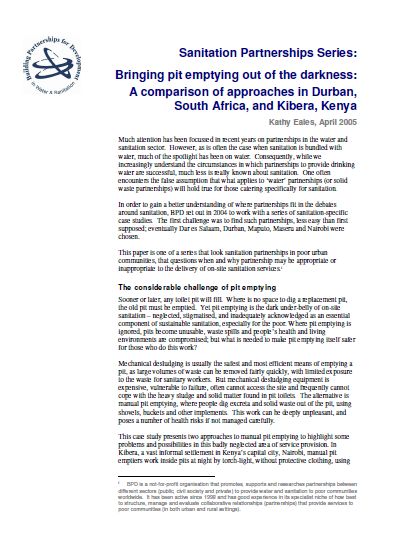
Published in: 2005
Publisher:
Building Partnerships for Development (BPD), Water and Sanitation for the Urban Poor (WSUP), UK
Author:
Eales, K.
Uploaded by:
SuSanA secretariat
Partner profile:
common upload
6149 Views
36 Downloads
Location of library entry
Content - Summary
This Sanitation Series paper, referencing two case studies from South Africa and Kenya to discudd when partnerships are appropriate.
Sooner or later, any toilet pit will fill. Where is no space to dig a replacement pit, the old pit must be emptied. Yet pit emptying is the dark under-belly of on-site sanitation – neglected, stigmatised, and inadequately acknowledged as an essential component of sustainable sanitation, especially for the poor. Where pit emptying is ignored, pits become unusable, waste spills and people’s health and living environments are compromised; but what is needed to make pit emptying itself safer for those who do this work?
This case study presents two approaches to manual pit emptying to highlight some problems and possibilities in this badly neglected area of service provision. In Kibera, a vast informal settlement in Kenya’s capital city, Nairobi, manual pit emptiers work inside pits at night by torch-light, without protective clothing, using rented basic equipment, subject to abuse and stigmatization, and dependent for jobs on agents of the landlords; the waste is commonly disposed of by dumping it into the settlement’s streams. By contrast, city management in Durban, South Africa, is experimenting with a small contractor development-cum -franchise model for manual pit emptying: sub-contractors will employ teams of wage labourers who enjoy the protection of the law, and who work in daylight with long-handled shovels, heavy gloves and gumboots, transferring pit waste from drums to specially modified waste skips, where it is screened before being disposed of safely.
What the Kibera workers we spoke to want above all is public acknowledgement of the value of their work, and acknowledgement of its hazards. They say they feel invisible, yet are vulnerable to attack because of the work they do. This paper attempts to highlight some aspects of their work, while contrasting it with the very different approach being taken in Durban.
Bibliographic information
Eales, K. (2005). Sanitation Partnerships: Bringing pit emptying out of the darkness. Building Partnerships for Development (BPD), Water and Sanitation for the Urban Poor (WSUP), UK
Filter tags
English Sub-Saharan Africa














